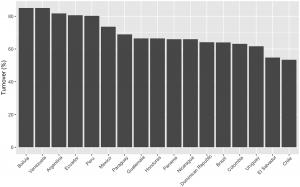Extreme turnover of Latin American legislators highlights political instability in the region
Legislative turnover—the percentage of legislators replaced after each election—is found to average around 70% across Latin America, far surpassing turnover rates observed in Europe (where typically only 30% to 40% legislators are newcomers), the United States, or even other emerging democracies. In some countries, like Bolivia and Ecuador, turnover rates exceed 80%, signaling a profound instability within national parliaments.
Moreover, even in countries where personnel stability has been relatively high - in El Salvador and Chile - turnover has risen sharply in recent elections, reflecting the decay of their once stable party systems. Very low legislative turnover has in turn become typical of the region’s most recent dictatorship, Nicaragua.
Karel Kouba, the lead researcher from Charles University’s Faculty of Arts, emphasizes the dual consequences of extreme turnover. "On one hand, high turnover can prevent the entrenchment of oligarchies within democratic institutions," Kouba explains. "On the other, extreme turnover rates witnessed in some countries may undermine policy continuity, weaken legislative professionalism and damage existing party-voter linkages."
Kouba and his co-author Michael Weiss identified critical institutional factors driving high turnover rates: longer legislative terms, staggered elections, and legislator term limits significantly boost legislator replacement. “Unlike presidential term limits whose adoption in the region has served to strengthen democracy, the effects of legislative term limits which function in six Latin American countries may impact democratic governance negatively,” explains Kouba.
The findings challenge recent political reforms promoting legislative term limits, suggesting they may unintentionally exacerbate instability and legislative inefficiency. "Term limits, meant to foster the renewal of political elites, contribute to extreme rates of turnover that amplify political instability," Kouba points out. "This makes legislative bodies vulnerable to continual policy disruptions, weakening parliamentary efficiency."
Both authors for the first time collected data on every single legislator elected in Latin America since 1980s. Identifying if they were newcomers or incumbents, this has allowed them to calculate turnover rates in the region for the first time for such a long period of time and reveal many surprising patterns. This new dataset, made publicly available by the researchers, offers valuable tools for policymakers, scholars, and political institutions striving to balance democratic renewal with governmental stability.
Ina Palacká
Faculty of Arts, Charles University
email us here
Legal Disclaimer:
EIN Presswire provides this news content "as is" without warranty of any kind. We do not accept any responsibility or liability for the accuracy, content, images, videos, licenses, completeness, legality, or reliability of the information contained in this article. If you have any complaints or copyright issues related to this article, kindly contact the author above.
Synthetic Biology Market to Hit USD 84.7 Billion by 2035, Fueled by Advances in Gene Editing and Bio-Manufacturing
Zealmax Ortho at Pharmatech & Health, East Africa 2025, August 21-23, 2025
Metro East’s ISA Certified Arborists Offer 24/7 Emergency Tree Services to Protect Homes and Businesses
Więcej ważnych informacji
 Jedynka Newserii
Jedynka Newserii

 Jedynka Newserii
Jedynka Newserii

Farmacja

Nowy pakiet farmaceutyczny ma wyrównać szanse pacjentów w całej Unii. W Polsce na niektóre leki czeka się ponad dwa lata dłużej niż w Niemczech
Jeszcze pod przewodnictwem Polski Rada UE uzgodniła stanowisko w sprawie pakietu farmaceutycznego – największej reformy prawa lekowego od 20 lat. Ma on skrócić różnice w dostępie do terapii między krajami członkowskimi, które dziś sięgają nawet dwóch–trzech lat. W Unii Europejskiej wciąż brakuje terapii na ponad 6 tys. chorób rzadkich, a niedobory obejmują również leki ratujące życie. Nowe przepisy mają zapewnić szybszy dostęp do leków, wzmocnić konkurencyjność branży oraz zabezpieczyć dostawy.
Handel
Wzrost wydobycia ropy naftowej nie wpłynie na spadek cen surowca. Kierowcy jesienią zapłacą więcej za olej napędowy

Sierpień jest trzecim z rzędu miesiącem, gdy osiem krajów OPEC+ zwiększa podaż ropy naftowej na globalnym rynku; we wrześniu nastąpi kolejna zwyżka. Kraje OPEC, zwłaszcza Arabia Saudyjska, chcą w ten sposób odzyskać udziały w rynku utracone na skutek zmniejszenia wydobycia od 2022 roku, głównie na rzecz amerykańskich producentów. Nie należy się jednak spodziewać spadku cen ropy, gdyż popyt powinien być wysoki, a pod znakiem zapytania stoi dostępność ropy z Rosji. Nie zmienia to faktu, że jesienią ceny paliw na stacjach zazwyczaj rosną, a w największym stopniu podwyżki dotyczyć będą diesla.
Nauka
Szacowanie rzeczywistej liczby użytkowników miast dużym wyzwaniem. Statystycy wykorzystują dane z nowoczesnych źródeł

Różnica między liczbą rezydentów a rzeczywistą liczbą osób codziennie przebywających w Warszawie może sięgać nawet niemal pół miliona. Rozbieżności są dostrzegalne przede wszystkim w dużych miastach i ich obszarach funkcjonalnych. Precyzyjne dane populacyjne są tymczasem niezbędne w kształtowaniu usług społecznych i zdrowotnych, edukacyjnych, opiekuńczych, a także w planowaniu inwestycji infrastrukturalnych. W statystyce coraz częściej dane z oficjalnych źródeł, takich jak Zakład Ubezpieczeń Społecznych, są uzupełniane o te pochodzące od operatorów sieci komórkowych czy kart płatniczych.
Partner serwisu
Szkolenia

Akademia Newserii
Akademia Newserii to projekt, w ramach którego najlepsi polscy dziennikarze biznesowi, giełdowi oraz lifestylowi, a także szkoleniowcy z wieloletnim doświadczeniem dzielą się swoją wiedzą nt. pracy z mediami.









.gif)

 |
| |
| |
|